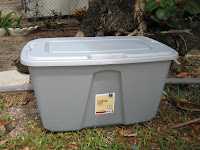I did some research to see what my options were and decided to start on a smaller scale, just to try it out first. I went to K-Mart the other day and bought myself a 32-gallon plastic storage bin. You can start with a smaller bin than this one but I got this size because I had already accumulated a good amount of yard clippings and leaves from my garden.
Now, here's the not-so-fun part... So apparently, the microorganisms and bacteria that break down waste into compost like oxygen (aerobic), so in order to make sure they're getting sufficient O2, it's important to poke holes all over your plastic bin (including the top lid and bottom). I used this handy little pick shown below to poke small holes on every side, top, and bottom of the bin. You want your holes to be small enough to deter any small vermin from getting in. (A word to the wise, use the hand opposite to the one holding your tool to help drive the tool into the plastic - it'll make it easier and faster.) Of course, there's always a power drill, just be careful if you do use one that you don't crack the plastic.
I'm not going to lie, this was tedious work, but it's best to just knock it out once and get it over with.
And now you're ready! Time to gather the materials you're going to add to your bin. You should gather an equal amount of green (fresh grass clippings, veggie and fruit scraps, coffee grounds, tea bags) and brown (dry yard leaves, wood chips, sawdust) materials. You want the moisture in your bin to be equivalent to the moisture of a wrung-out sponge. This environment will promote microbial activity that's conducive to the breakdown of your materials. Too much water and you'll prevent O2 from getting to the bacteria, too little and you're composting time will slow down significantly. For more tips, check out this helpful website.
I added some old apples, mango peels, and coffee grounds to my bin today. :)
In the coming weeks I'll let you know how my compost is coming along and what's been working for me or hasn't. Hope everyone's having a good week!





No comments:
Post a Comment